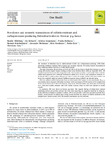2021-11-27Zeitschriftenartikel
Prevalence and zoonotic transmission of colistin-resistant and carbapenemase-producing Enterobacterales on German pig farms
Effelsberg, Natalie
Kobusch, Iris
Linnemann, Sabrina
Hofmann, Franka
Schollenbruch, Hannah
Mellmann, Alexander
Boelhauve, Marc
Köck, Robin
Cuny, Christiane
The treatment of infections due to colistin-resistant (Col-E) and carbapenemase-producing (CPE) Enterobacterales challenges clinicians both in human and veterinary medicine. Preventing zoonotic transmission of
these multidrug-resistant bacteria is a Public Health priority.
This study investigates the prevalence of Col-E and CPE on 81 pig farms in North-West Germany as well as
among 138 directly exposed humans working on these farms. Between March 2018 and September 2020, 318
samples of porcine feces were taken using boot swabs. Farm workers provided a stool sample. Both a selective
culture-based approach and a molecular detection of colistin (mcr-1 to mcr-5) and carbapenem resistance determinants (blaOXA-48/blaVIM/blaKPC/blaNDM) was used to screen all samples. Isolates from farm workers and
farms were compared using core genome multilocus-sequence typing (cgMLST) and plasmid-typing.
CPE were cultured neither from porcine feces nor from human stool samples. In one stool sample, blaOXA-48
was detected, but no respective CPE isolate was found. Col-E were found in 18/318 porcine (5.7%) samples from
10/81 (12.3%) farms and 2/138 (1.4%) farmers, respectively. All Col-E isolates were Escherichia coli harboring
mcr-1. Both farm workers colonized with Col-E worked on farms where no Col-E were detected in porcine
samples.
In conclusion, CPE were absent on German pig farms. This supports findings of culture-based national
monitoring systems and provides evidence that even when improving the diagnostic sensitivity by using molecular detection techniques in addition to culture, CPE are not prevalent. Col-E were prevalent in porcine feces
despite a recent decrease in colistin usage among German livestock and absence of colistin treatments on the
sampled farms. Farmers carried Col-E, but zoonotic transmission was not confirmed.
Files in this item

